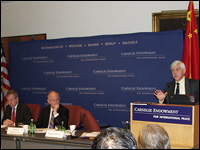{
"authors": [
"Albert Keidel",
"Nick Lardy",
"Pieter Bottelier"
],
"type": "event",
"centerAffiliationAll": "",
"centers": [
"Carnegie Endowment for International Peace"
],
"collections": [],
"englishNewsletterAll": "",
"nonEnglishNewsletterAll": "",
"primaryCenter": "Carnegie Endowment for International Peace",
"programAffiliation": "",
"programs": [
"Asia"
],
"projects": [],
"regions": [
"China"
],
"topics": [
"Economy",
"Trade"
]
}
The End of an Era? Inflation Returns to China
Thu, October 25th, 2007
Washington, D.C.
Keidel's policy brief focuses on the risk of inflation crisis in China. According to the statistics provided by the report, Consumer Price Index in China has surged in the past few months especially in the food sector, and risk of social unrest appears likely if the Chinese government does not take preemptive steps to cool down the overheating economy. Keidel emphasized the devastating consequence of mismanaged inflation by connecting China’s last major inflation crisis, which took place in 1988, with the massive public demonstration at Tianamen Square in 1989 that led to the bloody crackdown. In order to remedy the situation, Keidel recommended the Chinese authority to take the following measures; first, the government should increase imports of fine grains from the U.S, because grain shortage is the primary factor behind the surging food price. Secondly, deposit rate in Chinese banks must be raised above inflation rate. Contrasts to conventional wisdom, China’s double-digit economy growth in recent years is driven by domestic demand rather than export. Therefore an increase in returns from the bank could prepare the general public to match the current inflation. Finally, U.S policymakers should re-assess the source of economic growth in China so that more effective policies can be formulated to improve economic relation between the two governments.
Nick Lardy started his comment by questioning the report’s claim on the origin of current inflation in China. He argued that in retrospect China’s inflation has primary been driven by sharply raising investments rather than shortage of crops. The report fails to realize that additional factors such as bubbles in asset market have also been the major factors behind China’s inflation. Finally, Policy recommendations from the report appears to be overwhelmingly focused on fixing inflation in the long run without offering rationales to address the problem in short-term.
Pieter Bottelier challenged the origin of China’s inflation crisis as well. Similar to Lardy, he believed that the report has marginalized the influence of financial factors such as the excessive liquidity on fuelling the current inflation.
Carnegie does not take institutional positions on public policy issues; the views represented herein are those of the author(s) and do not necessarily reflect the views of Carnegie, its staff, or its trustees.
Event Speakers
Keidel served as acting director and deputy director for the Office of East Asian Nations at the U.S. Department of the Treasury. Before joining Treasury in 2001, he covered economic trends, system reforms, poverty, and country risk as a senior economist in the World Bank office in Beijing.
Nick Lardy
Bottelier was a nonresident scholar in Carnegie’s International Economics Program and senior adjunct professor of China studies at the School of Advanced International Studies (SAIS), the Johns Hopkins University. His work currently focuses on China’s economic reform and development.

